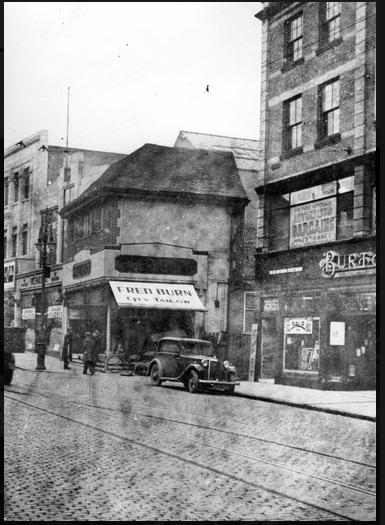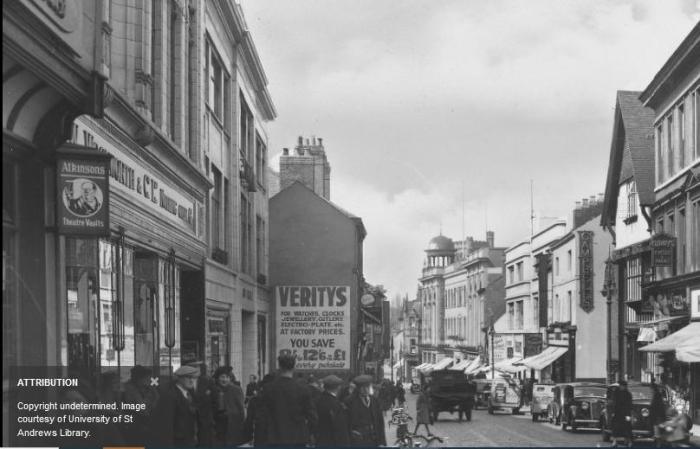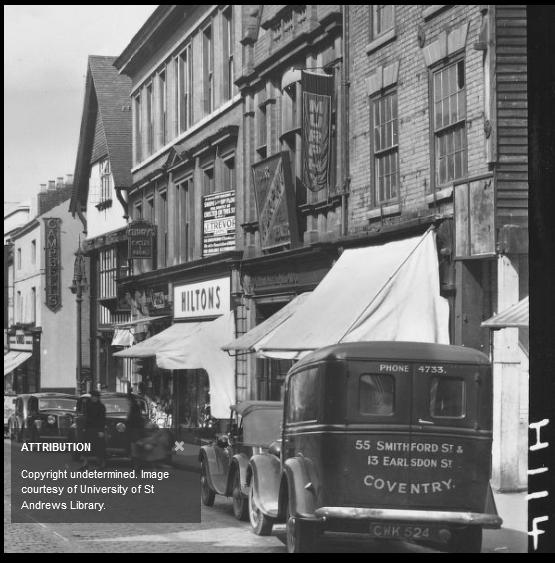|
Helen F
Warrington |
256 of 282
Sun 17th Mar 2024 5:27pm
It's probably after 1926 because the fenced building was still the Fountain Inn on the map. |
| Streets and Roads - Burges and Cross Cheaping | |
|
Choirboy
Bicester |
257 of 282
Sun 17th Mar 2024 6:27pm
Thank you Rocksolid for the information about Fred Burn. My father, not finding a job in his home town of Newport, cycled to Coventry and was found a temporary sales job at Fred Burn by his brother-in-law, Sid Peck, who worked there. I have always wondered where the shop was and why I could find no trace of Fred Burn when I searched post-war. I remember we had several pattern books of material that my mother said she had saved to make patches if we had torn our trousers or worn through the elbows. |
| Streets and Roads - Burges and Cross Cheaping | |
|
rocksolid
Bristol |
258 of 282
Sun 17th Mar 2024 10:45pm
Here is Fred Burn's short-lived new shop:
 It's likely that Fred couldn't compete with near-neighbours and new arrivals The Fifty Shilling Tailors on the far left (22-25 Cross Cheaping) and Montague Burton who had moved across from 3 Burges and taken over 1 & 2 Burges from Comley's furnishers
It's likely that Fred couldn't compete with near-neighbours and new arrivals The Fifty Shilling Tailors on the far left (22-25 Cross Cheaping) and Montague Burton who had moved across from 3 Burges and taken over 1 & 2 Burges from Comley's furnishers |
| Streets and Roads - Burges and Cross Cheaping | |
|
Choirboy
Bicester |
259 of 282
Mon 18th Mar 2024 7:47am
My father arrived in Coventry ~1936/7, he did not stay long in retail and got a job at Bretts before getting one as a machinist (he had trained on lathes and milling machines) in the jobbing shop at GEC Radio Works, Ford Street. My uncle, Sid Peck, had a smallholding near Southam and spent the war there, dying soon after the war. My father's move to Brett's could have been caused by the demise of Fred Burn's shop. |
| Streets and Roads - Burges and Cross Cheaping | |
|
Helen F
Warrington |
260 of 282
Mon 18th Mar 2024 8:53am
On 17th Mar 2024 10:45pm, rocksolid said:
Here is Fred Burn's short-lived new shop:
Note that the buildings in the furthest distance had been set back from the original road line, so some time after the first photo (ah, I see you did in comment 255, sorry). Fred's building might have had a face lift but it was a refurb of the timber building and was still on the original building line. He could have been bought out by the council to complete the road widening. If Choirboy is right and his father worked there in about 1936/37, it sets an upper limit on the two old photos. The first records Fred moving in and the second would be about the time he moved out.
nb, Just goes to show how when you think you are walking down an ancient pavement, you're actually walking through someone's front room. It's likely that Fred couldn't compete with near-neighbours and new arrivals The Fifty Shilling Tailors on the far left (22-25 Cross Cheaping) and Montague Burton who had moved across from 3 Burges and taken over 1 & 2 Burges from Comley's furnishers
It's likely that Fred couldn't compete with near-neighbours and new arrivals The Fifty Shilling Tailors on the far left (22-25 Cross Cheaping) and Montague Burton who had moved across from 3 Burges and taken over 1 & 2 Burges from Comley's furnishers
|
| Streets and Roads - Burges and Cross Cheaping | |
|
NeilsYard
Coventry |
261 of 282
Mon 18th Mar 2024 11:17am
Geoff I'm in contact with the chap who posted these on Facebook. They were discovered as negatives by his Dad in a house clearance in the 70s and he has only just got around to digitising them to make them available to view as he is a photographer himself. He is interested in making them available to all via Coventry Digital so I am going to speak to Ben (bk on here) about meeting up and getting them added (Give is a shout Ben!) Then you will be able to see them all...... |
| Streets and Roads - Burges and Cross Cheaping | |
|
rocksolid
Bristol |
262 of 282
Mon 18th Mar 2024 11:53am
 |
| Streets and Roads - Burges and Cross Cheaping | |
|
rocksolid
Bristol |
263 of 282
Mon 18th Mar 2024 11:58am
On 18th Mar 2024 11:17am, NeilsYard said:
Geoff I'm in contact with the chap who posted these on Facebook. They were discovered as negatives by his Dad in a house clearance in the 70s and he has only just got around to digitising them to make them available to view as he is a photographer himself. He is interested in making them available to all via Coventry Digital so I am going to speak to Ben (bk on here) about meeting up and getting them added (Give is a shout Ben!) Then you will be able to see them all......
Neil,
That's brilliant, I'm always eager to see 'new' old images of the city centre streets pre-war, as well as during and after the war.
Many thanks, Geoff |
| Streets and Roads - Burges and Cross Cheaping | |
|
Annewiggy
Tamworth |
264 of 282
Mon 18th Mar 2024 12:08pm
Looking through the newspapers he seems to jump around a lot. In 1934 and 1937 he is advertising at 27 Cross Cheaping and 53 Smithford Street, although the council bought the lease in 1936. There was a fire at the Smithford Street premises in March 1935. In 1933 22 to 25 were offered for sale by Odells. The owner was Mr G B Philpin and in 1936 Mr A H Jarrard conveyed 27 Cross Cheaping to the Corporation for £9,500 and they bought Fred Burn's lease for £500. In 1835 Rational Tailoring opened at 22 to 25 Cross Cheaping and were also trading at 25/26 Smithford Street. After 27 Cross Cheaping was demolished there were plans to build a news theatre in the site but this fell through. |
| Streets and Roads - Burges and Cross Cheaping | |
|
NeilsYard
Coventry |
265 of 282
Mon 18th Mar 2024 12:45pm
'New' old images are what I'm here for Geoff - always on the hunt - I just need the likes of Helen/Anne/Rob and the team to sometimes tell me where they are! |
| Streets and Roads - Burges and Cross Cheaping | |
|
rocksolid
Bristol |
266 of 282
Mon 18th Mar 2024 4:52pm
On 18th Mar 2024 12:08pm, Annewiggy said:
Looking through the newspapers he seems to jump around a lot. In 1934 and 1937 he is advertising at 27 Cross Cheaping and 53 Smithford Street although the council bought the lease in 1936. There was a fire at the Smithford Street premises in March 1935. In 1933 22 to 25 were offered for sale by Odells The owner was Mr GB Philpin and in 1936 Mr AH Jarrard conveyed 27 Cross Cheaping to the Corporation for £9500 and they bought Fred Burn's lease for £500. In 1835 Rational Tailoring opened at 22 to 25 Cross Cheaping and were also trading at 25/26 Smithford Street . After 27 Cross Cheaping was demolished there were plans to build a news theatre in the site but this fell through.
Wow, Anne, you are a real sleuth. This is all fascinating stuff. I have no mid-1930s directories only the 1931 and 1939 so wasn't aware Fred had another branch at 53 Smithford Street, by 1939 it was Hilton's shoe shop at the entrance to Drinkwater Arcade:
 This is the other half of the image in my last post (Verity's).
I must admit not having heard of Rational Tailoring before, however the two addresses tie up exactly with The Fifty Shilling Tailors branches. They were owned by Price's Tailors and also had branches trading as The Thirty-five Shilling Tailors. Post-war they couldn't sustain those low prices (it was supposed to represent the cost of a suit, can you imagine!) that they rebranded as John Collier:
https://buildingourpast.com/2022/04/12/the-fifty-shilling-tailor-and-john-collie....
Finally I was amazed that anyone would consider opening a news theatre at 27 Cross Cheaping, it's such a small site (unless it goes back a long way of course)
This is the other half of the image in my last post (Verity's).
I must admit not having heard of Rational Tailoring before, however the two addresses tie up exactly with The Fifty Shilling Tailors branches. They were owned by Price's Tailors and also had branches trading as The Thirty-five Shilling Tailors. Post-war they couldn't sustain those low prices (it was supposed to represent the cost of a suit, can you imagine!) that they rebranded as John Collier:
https://buildingourpast.com/2022/04/12/the-fifty-shilling-tailor-and-john-collie....
Finally I was amazed that anyone would consider opening a news theatre at 27 Cross Cheaping, it's such a small site (unless it goes back a long way of course)
|
| Streets and Roads - Burges and Cross Cheaping | |
|
Annewiggy
Tamworth |
267 of 282
Mon 18th Mar 2024 7:53pm
There seems to be a lot of tailors round at that time, all trying to say they made the cheapest suits. There is a Fred Burn, tailor in Birmingham, so I don't know if that is the same man. I did find an ad that said Fred had 2 other shops but I will have to find that again. The cinema was going to be built by Capital and Provincial news theatres Ltd and was to seat 400 people with a shop in front, so not too small. They pulled out of the project, saying they could not carry it out. |
| Streets and Roads - Burges and Cross Cheaping | |
|
Choirboy
Bicester |
268 of 282
Tue 19th Mar 2024 8:51am
"...If Choirboy is right and his father worked there in about 1936/37...". My father started at the GEC in 1938. He married in 1937 and was employed at Fred Burn's at the time before getting a job at Bretts. I am not certain of the date he arrived in Coventry and started at FB though. |
| Streets and Roads - Burges and Cross Cheaping | |
|
Helen F
Warrington |
269 of 282
Tue 19th Mar 2024 10:22am
On 18th Mar 2024 11:53am, rocksolid said:
the council would have been keen to have a complete set-back building line. Did they have compulsory purchase as we know it today back in the 1930s?
I get the impression that the answer to that was probably 'no' and maybe didn't come in till the 60s. Certain schemes took a long time to bring to fruition because people wouldn't sell. All over the city you see sections pulled back from the original street line but other stretches remained narrow for years. There are maps with plots marked out by owner and what they had been paid to secure the land. A good example was the area earmarked for the Council House and the police station. Bigger chains were often the first to sell but smaller owners held on, probably because it was harder for them to set up elsewhere. The first of the road widening demolitions were the gatehouses, followed by the front of the Grammar School and then certain road junctions eg Fleet Street near St John's; Broadgate and Smithford Street (creating the large open space we are familiar with); Much Park Street and Jordan Well; West Orchard and Cross Cheaping; Cox Street and Jordan Well. The same had to happen for new roads eg Whitefriars Street. We've discussed the creation of Hertford Street and found that they were originally going to widen Greyfriars Lane and Warwick Lane, which prompted the movement of Peeping Tom from the corner of Greyfriars Lane to the building that became the corner of Hertford Street and Smithford Street.
On 18th Mar 2024 11:53am, rocksolid said:
It's intriguing that Comley's 1914 building was the first to be set back in this stretch, did they foresee how traffic would increase so much that it necessitated widening main streets? By the early-mid 1930s widening shopping streets was happening everywhere but in a very haphazard piecemeal way.
I suspect that the council could see the need and prompted Comley's to move backwards. It also included building over the river, which would have involved extra work but added to the width of the plot. The road building resulted in a lot more of the river being culverted and smaller streams being diverted eg the Radford Brook was forced to join the Shebourne at West Orchard, thus erasing the second bridge of the Burges. Hales Street, created not long before the Board of Health maps were drawn, was built over the river and the land that had originally been the Priory Mill pool. The rest was turned into the cattle market.
The early part of the 1900s saw a lot of demolition to remove slums but even that required the council to give owners a chance to improve properties rather than demolish them. I get the impression that under those laws they could force an owner to sell if they failed to make the properties healthy by the standards of the time. Owners would take advantage of money offered to avoid having to improve properties eg the butcher/slaughterer on the corner of Jordan Well and the new Whitefriars Street sold up to those who built the Gaumont but might have also been compensated for closing the slaughterhouse which was both the busiest in the city and very unsanitary.
|
| Streets and Roads - Burges and Cross Cheaping | |
|
rocksolid
Bristol |
270 of 282
Tue 19th Mar 2024 7:04pm
Fascinating stuff. It brings to mind a passage in the excellent book (still available) 'Coventry - The making of a modern city 1939-1973' by Jeremy and Caroline Gould, published by Historic England.
"The new Council House enabled Earl Street to be widened with the intention that it be continued into High Street. The plan was immediately thwarted however, by Barclays Bank (now Yorkshire Bank) who, as early as 1919, refused to move the face of their new building back 7ft (2.13 m) to the proposed building line. On the south side the facades of the National Provincial Bank (1929-1930) and Lloyds Bank (1932) were each set back"
Later on the authors write that Ernest Ford the city engineer and planning officer had limited powers for radical redevelopment but the creation of Corporation Street and Trinity Street meant demolition of a considerable number of properties.
Regarding Corporation Street here is what the Herbert says:
"It wasn't until 1920 and the passing of the Coventry Corporation Act, that the Council was finally able to go ahead with its plans. In the next five years, it would acquire the vast array of properties that populated the site - several licensed premises, numerous factories and shops, as well as eighty seven houses. These houses were little more than slum dwellings, arranged in courts that often stood in the shadow of old factory walls. The ground beneath them was riddled with old cellars and wells. The Council would eventually build eighty homes at Gulson Road to replace the ones it demolished, as well as take special precautions to secure the new carriageway's foundations"
This suggests that in order to carry out significant demolitions an Act of Parliament had to be passed at that time? |
| Streets and Roads - Burges and Cross Cheaping | |
Website & counter by Rob Orland © 2024
Load time: 574ms